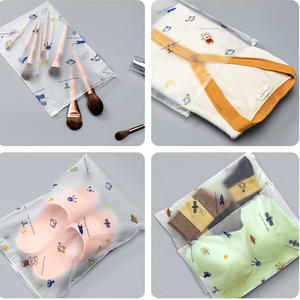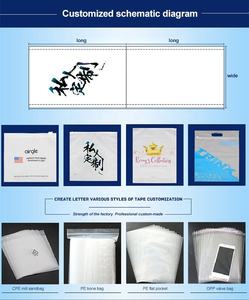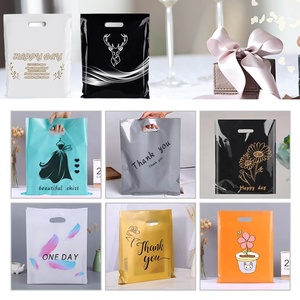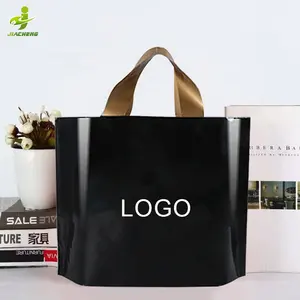
All categories
Featured selections
Trade Assurance
Buyer Central
Help Center
Get the app
Become a supplier

(1361 products available)




















































Plastic carrier bags come in a variety of useful types to meet the diverse business requirements of retail establishments.
Over fifty years ago, T-shirt bags were created. They are made of HDPE plastic film and are tough enough to carry heavy items. T-shirt bags are characterized by their broad, comfortable handles and easy-to-carry design. The name "T-shirt bag" comes from the resemblance of its handles to a T-shirt's shape. Due to their strength and usability, they are widely employed in the grocery sector. They may also be thermally sealed for reuse or masqueraded as trash bags.
Plastic flat bags consist of even material with no added features beyond the seams. Such a simple design attracts many shops, especially those with low-density products like books or clothes. Due to their straightforward construction, flat bags are cheaper than some other styles of carriers. Custom printing on flat bags is easy, empowering businesses to spread their brand effectively.
Block-headed bags are like flat bags but with a top closer that lets them seal with a blockhead seal. Their strength makes them good for heavy things like hardware, tools, or glass. These bags do not have any special designs or printed patterns. The big, strong handles are made for carrying big, heavy items. Many companies use these bags to pack their goods safely and tightly. The simple but strong design lets block-headed bags work well in tough retail settings.
The most common type of die-cut bags used in retail, this particular bag is manufactured using low-density polyethylene (LDPE) or high-density polyethylene (HDPE). Such bags have a die-cut handle that can support heavy weights, making them suitable for handing out to customers. Many businesses value these bags because they can be customized with store logos and promotional prints. In addition to being an effective marketing tool, die-cut bags are ideal for use in boutiques, grocery marts, and many other stores.
Plastic bags can be printed with retail logos for marketing and are made to be strong, stylish, and bank-friendly.
The majority of plastic carrier bags available in retail stores today are made of polyethylene. Polyethylene, or PE for short, comes in two types. Low-density polyethylene, or LDPE, is softer and more flexible. It is commonly used for bags that sell produce or carry dry cleaning items. The other type is HDPE, or high-density polyethylene. It is denser and stiffer. Many grocery stores use HDPE bags because they do not tear easily. PE bags hold heavy things yet remain light in weight.
Many shoppers want alternatives to regular plastic due to the harm it causes our earth. Biodegradable plastics break down faster than standard polyethylene bags made from petroleum. Some biodegradable bags last only a few years instead of decades or centuries. However, they are stronger than paper raincoats. They can use modified PE or starch blends to create them. Consumers appreciate such bags for their reduced pollution impact.
Woven polypropylene bags represent a sturdier option for plastic carriers. Polypropylene or PP, is woven into a fabric-like structure. This gives carriers woven strength for heavier loads without ripping, unlike typical plastic. One such bag is perfect for big purchases like laundry baskets or books. Though tougher, woven bags remain flexible and easy to carry. Their durability promotes multiple uses, further helping efforts to reduce environmental waste.
Plastic and paper hybrid bags aim to take the best of both materials. With paper's ability to break down and plastic's weather resistance, they last only around five years including plastic tops and bottoms in different weather. These composite carriers are quite strong yet recyclables if thrown in the proper bin. Their design allows us to keep using plastic minimal while retaining durability for heavy loads. This development continues the search for trash-friendly alternatives.
Plastics printed with logos are important for many businesses besides just their role as carry-out bags.
Print carrier bags perform beyond simply transporting goods. Stores use colorful bags with symbols and catchphrases as advertisement tools. When consumers go home with these bags, they promote the business wherever they go. This is called "ambient marketing." It builds good feelings about the brand. Saks Fifth Avenue sells printed canvas bags for its "friends of saks" loyalty program. Each one costs $5. These exclusive bags spread the retailer's prestige image.
Dry cleaners, paper stores, and stationery shops frequently use plastic flat bags to keep items neat. The clear plastic shows what is inside, yet packaging protects the item from dust or spills. Flat bags customarily hold tightly folded clothes from the dry cleaner or special paper for a project. Their simple design makes a package that pleases and reassures customers receiving carefully tended merchandise.
Strong, woven polypropylene bags are perfect for promotions. Their sturdiness means customers use them again and again. Supermarkets, charities, and events give or sell these holders to inspire green habits. They last as permanent vessels for purchases while subtly enhancing the sponsor's image in the community. Their reusability promotes plastic reduction and aligns retailers with sustainability.
Event organizers and convention centers buy custom-printed plastic carrier bags in bulk. As such handouts, they let participants carry materials like catalogs or promotional items. The plastic keeps materials safe from spills at conferences or fairs. Carrying their branded bags enables sponsors to market their services within the venue. Easy to customize for any event, these bags perform both function and design.
Selecting the perfect bag requires care about practical use, look, and value.
Bag style:
Bag size:
Thickness:
Materials:
Handle types:
Printing options:
Costs:
A1: Common techniques include screen printing, flexography, and digital printing, each offering different finishes and levels of detail.
A2: Yes, custom molds allow carrier bags to take unique shapes, forms, or designs beyond standard silhouettes.
A3: Conventional plastic may require hundreds of years, but options like cornstarch-based or bagasse bags take 1 to 5 years to degrade.
A4: High-density polyethylene carrier bags, which are strong, sturdy, and waterproof, are approved by the FDA for holding food items.
A5: Bagasse bags, made from sugar cane stalks, are strong, eco-friendly, and an excellent replacement for plastic carrier bags.